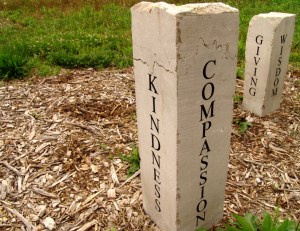
It’s that time of year. As 2013 comes to a close, many of us take time to reflect on what we’ve done well and how we could improve. Others formulate resolutions, creating goals that focus on personal or professional growth. Some may look at from where we’ve drawn strength and inspiration and what confounds us or makes us weak.
While this annual ritual of soul searching and goal setting can be healthy, it can also be daunting. Each year, I find myself aspiring to do more, be better and identify new and greater ways to give back to my community and my country. While I maintain the same desire to improve in 2014, I’m newly inspired to add a new goal to the list – to lead with compassion.
This past weekend, I received the most incredible news related to my Coast Guard reserve career. I’m advancing to chief petty officer on January 1! Becoming a chief in the Coast Guard is an immense honor and comes with new and remarkable responsibilities. Chiefs are often charged with the awesome tasks of molding future leaders in their enlisted ranks, providing guidance and leadership and setting the tone for the units in which they serve. However, the honor and privilege of advancing to chief might never have occurred but for the compassion of others.
During my deployment to Louisiana as the social media lead for the Deepwater Horizon response, I became the temporary target for many who were frustrated with the oil spill clean up or looking for anything they believed to be wrong with the operation. While unfair and misdirected, those across the social web and the media had the right – no matter how incorrect – to share their perspective. However, the toll of incessant and often mean-spirited public scrutiny combined with the stress of losing my civilian job when I returned to work left me somewhat broken, grasping for confidence and searching for faith in my abilities. I seriously considered transitioning out of the Coast Guard and began to evaluate new civilian career paths.

I’m lucky. I truly believe that the compassion of others allowed me to begin the process of personal rebuilding. My husband could not have been more supportive, traveling to Louisiana twice during the darkest days of my deployment and helping me to get back on my feet when I returned. Friends, family and acquaintances went out of their way to offer advice and provided chances to develop as a person and a professional. Many in the Coast Guard encouraged me to continue and even grow in my career, guiding me with wisdom and opportunities to regain my confidence. Eventually, I landed a new civilian position and, because of the benevolence of a few senior executives, soon found myself leading a high profile project. My support system demonstrated compassion in helping to get me back on track and identified the openings I needed to re-establish myself one step at a time.
If not for the compassion imparted to me by my husband, my friends, my family and my professional acquaintances, I might have made very different decisions about my life and my livelihood. However, I can’t help but consider some recent events that made an impression on me, as well. The passing of Nelson Mandela reminded me about his immense capacity for forgiveness and ability to heal a nation with his compassion for everyone – especially for those who wronged him. Pope Francis continues to surprise me with his messages of humility, open-mindedness and inclusion, causing many to take a fresh look at the papacy. I also remain hopeful that people will give PR professional, Justine Sacco, another chance following her encounter with a social media “lynch mob” and she can recover to become a stronger, smarter individual. I can’t help but believe that the takeaway in each of these instances is how some modicum of compassion can truly transform a life (or many lives).
As I enter this new phase of my Coast Guard career and take on 2014 with renewed focus and vigor, I am filled with appreciation and gratitude for my support system all over again. In an era of the 24-hour news cycle and the proliferation of social media (for good and for bad), I’m pledging to lead with compassion first and extend the same kindness and understanding that others demonstrated toward me.








You must be logged in to post a comment.